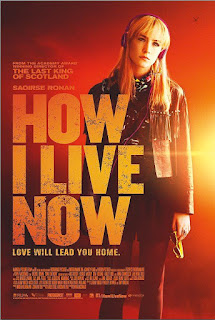New Yorker Daisy is sent to live with her cousins in England
when her issues become too much for her father and pregnant step mother to
handle. Daisy tends to keep to herself so her aunt and cousins don’t judge her
(to her perspective) for not eating or send her away like her stepmother has. A
few days later her aunt is called away to a conference, leaving the kids in the
care of the oldest cousin. The cousins are Osbert, who is the oldest at 17 and
the most normal; Isaac and Edmund, 14 and both have telepathic abilities, one
with animals and one with people; and Piper is the youngest and the only girl,
she has the same abilities as her brothers except with both animals and people;
Daisy is 15 and the protagonist, she has an eating disorder that features
somewhat prominently. Not long after Daisy’s aunt departs for Oslo, several
major cities are attacked and Britain is taken over by occupying forces. As
Osbert becomes involved in the local defense, the younger children are left
more and more to themselves. They continue their routine of collecting rations
and news from the village and try not to panic the rest of the time. During
this period, Edmund and Daisy start carry on a sexual relationship. Their
living situation is eventually found out when the defense forces take over
their home and separate the “children” and send them off to live adults in
various controlled, refugee communities. The twins are sent to one farm, the
girls to another and Osbert joins the soldiers (and that is pretty much the
only time he is involved in the story). When the girls’ refugee community is
attacked and overrun, the girls escape and try to make their way back to the only
place and only people Daisy considers home and family.
No I couldn’t have made that any longer without putting a
few major spoilers in there. It is written from
the point of view of Daisy and it feels that a teenager wrote it. Her thoughts
are spot on and her general disregard for adults who are not immediately
important is very typical of what it’s like to be a teenager. I’ve seen a lot
of reviews trash the novel because of the cousin sex thing but seriously? It’s
not graphic at all and it happens all the time even without the added pressures
of war and doubting you’ll live to see your next birthday. The Movie version
changes things up a little bit. Edmund is a bit older and not a twin, the
oldest brother is taken out completely, and they add a friend for Isaac. They
also leave out the epilogue and change the timing of minor events. The thing is
the movie is brutal; character deaths galore. Almost no one essential to Daisy’s
world dies in the book; that’s not to say other messed up things don’t happen,
but death? Not so much. They also downplay the telepathy and give Daisy a nasty
case of OCD and a germ phobia to go along with her anorexia. Both versions have
their good sides and bad sides. I thought they were phenomenally well done. It’s
been about a month since I’ve read the book and I can’t stop thinking about
what I would do in such a situation. I’m finding that other books just can’t
keep my attention because I keep comparing them to How I Live Now.


